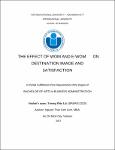| dc.description.abstract | Word “of mouth has been treated as one of the most powerful marketing method which can earns several times greater in terms of efficiency than traditional tools. Tourism sector in which most aspects are considered as intangible, even highly concerns and evaluate this type of communication. Despite plenty of researches focusing on the word of mouth construct conducted from both qualitative and quantitative approaches, the lack of investigating two concepts: traditional word of mouth and electronic word of mouth – the new evolved form, separately in a same research is undeniable, especially in tourism field.“
As the results, “this study aims to examine the differences as well as the linkage between two types of word of mouth, explore their influences on destination image and satisfaction in a destination in Vietnam. Further purpose of this research is to propose recommendations based on the research findings with the aims to generate and attract more inbound tourists and travelers. After reviewing relevant literature in tourism, the model was adapted and proposed with 5 hypotheses regarding traditional word of mouth’s and electronic word of mouth’s influences. Qualitative approach in the form of 1-to-1 interviews were carried out to adjust the measurement scales. In the next step, quantitative method was applied with the distribution of questionnaires through both online and offline in Ho Chi Minh City. 276 usable and valid answers were analyzed through multiple tests such as EFA, CFA and SEM to test the proposed hypotheses. The results do statistically support the impacts of electronic word of mouth on satisfaction, while traditional word of mouth is only evident with its influence on destination. Similar research is suggested to be conducted with a larger and diverse sample together with developing more appropriate measurement scale for the construct of word of mouth.“ The findings offer important implications for tourism marketing theory and practice. | en_US |


